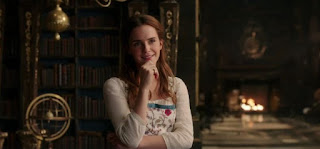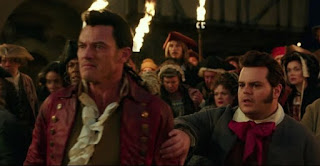Where a man is saved by a voice in the distance
It has been a long while since I've enjoyed a holiday, especially Christmas. I was as much a lover of it, of the magic of it, as any child until one day I just wasn't. One year I woke up and the magic was gone, the joy was gone, the happiness was gone. I stopped seeing the beauty and was stuck on the darkness. Christmas brought stress for my family and everyone fought and was Christmas really worth it?
The Christmas story wasn't worth the hassle nor was it motivation enough to encourage any deal of love for the day it represented. So what did I care that we were representing or memorializing the birth of Christ? Everyone knows that he was not actually born on Christmas. Besides, Easter always seemed more appropriate a time to talk about Christ what with the whole resurrection thing going on. Christmas was just another excuse for gifts and the like. Just another day trying to set itself apart from the others with no actual claim, rhyme, or reason.
It's the season of possible miracle cures
Where hope is currency and death is not the last unknown
These antagonistic antipathies toward the winter holidays (and really all holidays in general) made me more than a bit of a scrooge. I wanted nothing to do with anything Christmas; parties, presents, decorations, or family. Yet I had little choice in the matter as the world at large cared little for my emotions. Still, my misunderstood anger and hatred at all things festive effected my outlook in life and my relations with my family.
Where time begins to fade
And age is welcome home
I began to see that, even as the holidays became less magical and less joyous for me, I seemed to be dragging everyone else down with me. Traditions became less important, celebrations more forced, and the whole event became more materialistic holding little depth or meaning. I didn't see it at the time, as it appears impossible to see clearly that in which you are immersed. I think my first real reckoning of this shallow and depressing twist was after my first semester of college.
It's the season on eyes meeting over the noise
And holding fast with a sharp realization
It had been a rough few weeks (surgery and finals and packing up my apartment and a 14-hour drive home just a week after surgery...) and Christmas that year was much like any other that I had experienced. But, in a sense, I wasn't the same person who had experienced Christmas in the past. I was still me but slightly changed. I was growing up but, for once, "growing up" did not mean that I was growing callous or spiteful or antagonistic. I was growing a sense of awareness of despair and a yearning for hope. I now wanted the connection and the depth of the holiday that I remembered from my childhood, unfortunately that depth is hard to find when everyone around you has gone the other way, savoring the materialistic elements.
It's the season of cold making warmth a divine intervention
You are safe here you know now
And thus the tide changed and my desire for Christmas was reignited for the first time in years. However it wasn't an easy journey. If joy is a difficult emotion to find amidst despair and uncertainty, hope is even worse.
Don't forget
Don't forget I love
I love
I love you
Then I realized why Christmas is when it is (or rather why winter festivals were before they were brought into Christianity to reduce the validity of existing "pagan" religions). Winter is a time of despair. It is a time of uncertainty. It is a time when the world (most of the Northern Hemisphere at least) needs hope and restoration and faith that everything can be alright, that there is something more than the darkness and the cold and the isolation.
It's the season of scars and of wounds of the heart
Of feeling the full weight of our burdens
Even still with this need, I don't use the nativity story around Christmas, I use it during Easter. Christ's biblical life was about second chances and acceptance and inclusion. Spring seems a more meaningful and poignant time to celebrate such a man as it is the time when the world awakens and life begins again. I do not mind remembering the stories of Christ at any time of the year but I do not focus on them during Christmas (even if it is named after the Mass of Christ). It is truly hard to explain my Christmas celebration because in a way it is quite nontraditional. I don't tell the story of Christ or gather for Christmas services or even mention Christ as a contributor to the festivities. In an equal way it is rooted in tradition. I gather with family around a fir/pine tree (who cares if it is artificial?), watch Christmas movies, make cookies, open presents, have our traditional Christmas Eve dinner (pizza), and occasionally have more traditional Christmas Day meals. That is Christmas today for most people. It isn't as much a religious celebration as a secular one.
It's the season of bowing our heads in the wind
And knowing we are not alone in fear
Not alone in the dark
Christmas is a holiday of hope and connection. It isn't a connection that comes from some otherworldly deity but rather a connection formed from necessity and built into a tradition of companionship and gift giving. It is a holiday reminding us that the world isn't over, even in the darkest time of the year, and that it is through our relationships with others that we can continue. The Christmas season is a time where we give to others and support everyone, where divisions become less important and we are brought together in love and companionship. It is an ideal of how the world should be, opposing how it is. It is hope that there is the chance for change, the chance for love, the chance for understanding, the chance for something better.
Nowadays I do celebrate Christmas, wholeheartedly, but I don't celebrate the Mass of Christ. I celebrate my own secular Holiday Season that just happens to be called Christmas. It is a season where people come together and help each other, support each other, act like people. My Christmas is not religious but it is spiritual. It has faith and love and companionship. My Christmas might not be yours and that's alright because mine respects all people of all faiths and designs. My Christmas is a time, not day, in which I live my life how I wish to live every day, doing for others, helping others, supporting and being supported by others.
My Christmas is not religious but it is special and it is meaningful and it is beautiful and, most of all, it is a happy time of love and hope when it was not always.
Don't forget
Don't forget I love
I love
I love you.
Atheist Christmas Carol by Vienna Teng
Happy Christmas!






















